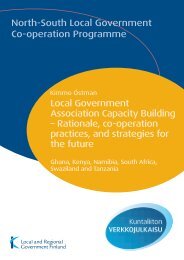E-READINESS QUESTIONNAIRE FOR NORTH ... - Kunnat.net
E-READINESS QUESTIONNAIRE FOR NORTH ... - Kunnat.net
E-READINESS QUESTIONNAIRE FOR NORTH ... - Kunnat.net
You also want an ePaper? Increase the reach of your titles
YUMPU automatically turns print PDFs into web optimized ePapers that Google loves.
74<br />
Table 53: Number of Personal Computers per 100 of the population of Swaziland<br />
Year Value<br />
2000 1.17<br />
2001 1.55<br />
2002 2.42<br />
2003 2.9<br />
2004 3.48<br />
2005 4.07<br />
2006 4.08<br />
Source: United Nations Statistics Division.<br />
8.7 Mbabane Local Government<br />
Mbabane (Swati: ÉMbábáne), with an estimated population of 95,000 (2007), is the<br />
capital and largest city of Swaziland. It is located on the Mbabane River and its tributary<br />
the Polinjane River in the Mdimba Mountains. It is located in the district of Hhohho,<br />
of which it is also the capital. The population (estimated) in 1987 was 30,000.<br />
The town grew after the nation’s administrative centre moved from Bremersdorp<br />
(now called Manzini) in 1902. It derives its name from a Chief, Mbabane Kunene,<br />
who lived in the area when British settlers arrived. It is also a commercial hub for the<br />
surrounding region, while tin and iron were mined nearby 93 .<br />
The Municipal Council of Mbabane is governed by the Urban Government Act<br />
of 1969. It is a progeny of the Ministry of Housing and Urban Development which<br />
is responsible for general governance of the urban areas in Swaziland. The Minister of<br />
Housing and Urban Development delegates most of his powers to the public to run<br />
the affairs of their own urban community. The public then elects a body of Councillors<br />
to form the Municipal Council which will in turn exercise the delegated authority<br />
to run the municipality. The Council enjoys a certain degree of autonomy. The<br />
responsibility of the Council is to make policies and draw different pieces of legislation<br />
necessary for the implementation of these policies. The minister, however, has to assent<br />
fi rst to most of these operations.<br />
The Council employs a Town Clerk (Chief Executive Offi cer or City Manager) to<br />
implement the policies and dictates pronounced at Council convergences. This offi<br />
cer reports direct to Council and in certain instances, to the minister. The other offi<br />
cers that are directly employed by the Councillors are the Directors of Public Works,<br />
Health and Finance. These offi cers can only be dismissed by the Council. The rest of<br />
the managers and staff are employed at the instance of the Chief Executive Offi cer 94 .<br />
Mbabane, and Swaziland itself, depend on tourism and sugar exports. The city has<br />
two sites for light industries.<br />
8.8 E-Readiness Analysis for Mbabane<br />
93 http://en.wikipedia.org/wiki/Mbabane<br />
94 http://www.mbabane.ord.sz/<br />
E-Readiness analysis for Mbabane based on questionnaire (see appendix). The electricity<br />
supply within the local government area is very good. Most households have access<br />
to a radio, TV and mobile phone access is very high. The availability of computers to<br />
households was average with the cost of inter<strong>net</strong> access being high. Not many residents<br />
can easily afford to access the inter<strong>net</strong> due to this high cost.<br />
On governance, responses indicate that the local government authority has shown a<br />
high commitment to the use if ICT for service delivery and these executives themselves<br />
have good competence in basic computer skills e.g. in browsing the inter<strong>net</strong>, sending




